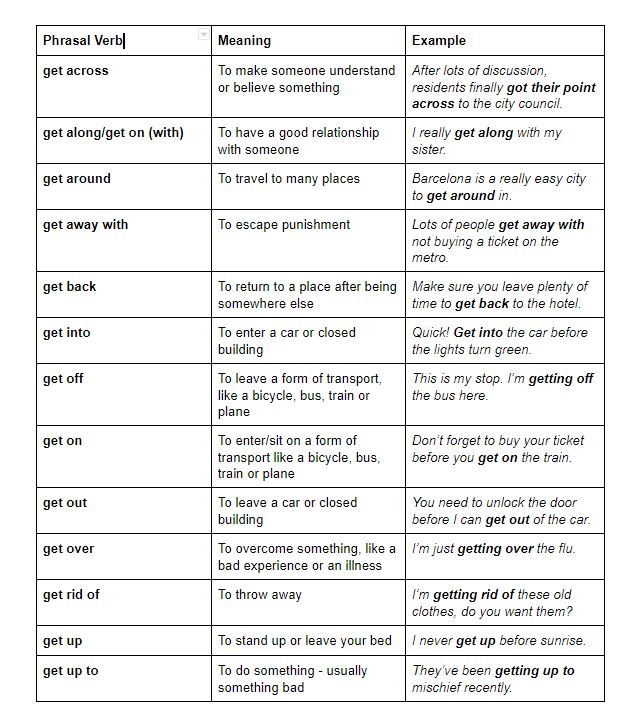The word ‘get’ is one of the most common and versatile verbs in English. It can be used in lots of different ways, and is usually seen in informal writing or speaking. You can use the word ‘get’ on its own, with a preposition to make a phrasal verb, or with a participle in the passive voice.
Now we’re going to look at some of these uses in more detail. So, let’s get started!
1. Get = to obtain, to receive, to buy
The word ‘get’ can be used as a verb to express the actions of obtaining, receiving or buying. To form a sentence, we use get + direct object or get + indirect object + object.
Let’s take a look at some examples. Don’t forget ‘get’ is an irregular verb, so when we use the past simple we change (or conjugate) to ‘got’
To obtain
- She got the telephone number from her boss.
- I got the grade to pass the course.
- Unfortunately, Henry didn’t get the job.
To receive
- Did you get my letter?
- He got a fine for driving too quickly.
- I got a delivery this morning.
To buy
- Can you get some milk from the shop?
- I didn’t get you a newspaper. I’m sorry.
- He’s just been shopping and got a new face cream.
2. Get = to reach, to arrive
We can use ‘get’ when talking about arriving or reaching a place, to express movement or travel. To form a sentence, we use get + place expression. After the word ‘get’, we also normally use the preposition ‘to’.
To reach
- How long did it take you to get to the top of the mountain?
- If you keep walking you’ll suddenly get to a bridge.
To arrive
- I usually get home at 7pm.
- What time do you get to school?
3. Get = to become
‘Get’ is also used to express a change of state or situation. To form a sentence, we use get + adjective.
To become
- Don’t get angry!
- Wear a jacket or you’ll get cold.
- The weather gets warmer starting in April.
- In the UK it gets dark at 5pm.
- After going for a run, I get really hungry.
4. Get as a phrasal verb
‘Get’ can be used in phrasal verbs, which have various meanings. To form a sentence, use get + preposition/adverb. Here are a handful of common examples:
5. Get in the passive
We can also use the word ‘get’ in the passive form. Here it is used in place of the verb ‘to be’ to sound more informal. So, instead of using the standard passive be + participle, we can also use get + participle. For example:
- My bike was stolen (standard passive)
- My bike got stolen (get passive)
We use the passive form when we want to emphasize the nature of the event, or the people involved instead of who does the action. For example:
- Mike just got promoted. (Emphasis on Mike rather than his boss)
- The burglar got arrested. (Emphasis on the burglar rather than the police)
‘Get’ is also very commonly used to describe negative events. For example:
- Our house got badly damaged in the storm.
- We got delayed coming back from London.
6. Get something done
Our final use of the word get is a more informal way of saying ‘to have something done’ for us or to us. This is normally when we pay for some kind of service – such as at the hairdresser, mechanic or dentist. To form a sentence, we use the structure get + object + past participle.
To get something done
- I’m getting my hair cut on Wednesday.
- I got my teeth checked at the dentist this morning.
- I need to get my laptop repaired.
- I’ll get your coat cleaned if you like.
- He gets his car washed every Saturday.
Enjoy this post? Check out our blog post: 10 phrasal verbs to help you become an English expert.
Glossary for Language Learners
Find the following words in the article and then write down any new ones you didn’t know.
Versatile (adj): able to be used for lots of different purposes.
Get started (exp): to begin.
Hairdresser (n): the place where you go for a haircut.
Key
adj = adjective
exp = adverb
n = noun
Study English at Oxford House Barcelona
Interested in taking an English course at Oxford House Barcelona? Check all the different English classes we can offer you now or in the summer, or contact us for more information.
Study English at Oxford House Barcelona
Interested in taking an English course at Oxford House Barcelona? Check all the different English classes we can offer you now or in the summer, or contact us for more information.
Updated on January 17, 2020
The verb get is one of the most common in English. Get is used as a stand alone verb with various meanings. However, get also combines with a variety of prepositions to form phrasal verbs with a wide range of meanings.
Here is a list of uses for get as a main verb, get in phrasal verbs, get in idiomatic usage, and the present perfect form of have got to indicate possession.
Get Alone
|
arrive |
She got to work an hour late. |
|
receive |
I got a book for my birthday. |
|
earn |
I get $7 an hour. |
|
bring or fetch |
Can you get that book for me? |
|
understand |
Do you get the lesson? |
|
affected by, or catch |
He got a cold last week. |
|
catch or take |
I got the 4:55 train to New York. |
|
communicate with |
I got him by phone. |
|
have a strong effect on |
That film really got me. |
|
capture or seize |
The police got him at the station. |
Get in Phrasal Verbs
I have chosen the main meanings to help you begin to learn phrasal verbs with get. However, these are not all meanings of these common phrasal verbs.
|
get about |
be socially active | Tom really gets about, doesn’t he? |
|
get at |
mean something |
I’m trying to get at the truth. |
|
get ahead |
be successful |
It’s very difficult to get ahead nowadays. |
|
get away |
escape |
The thief got away from the police. |
|
get back |
recover or retrieve |
I got my books back from Tom. |
|
get by |
To survive financially |
Sally gets by on just $1,000 a month. |
|
get in |
enter a car, train etc. |
Come on, get in! Let’s go. |
|
get into |
be accepted |
He got into the university of his choice. |
|
get off |
exit from a train, bus etc. |
Jerry got off at 52nd Street. |
|
get on with |
have a good relationship with |
I really get on well with Janet. |
|
get out |
leave |
I got out of class at 3.30. |
|
get over |
recover from an illness or bad occurrence |
He got over his operation very quickly. |
|
get through |
succeed in an examination, test etc. |
That was a difficult test to get through, wasn’t it? |
|
get up |
get out of bed |
I got up at 7 this morning. |
Get Idiomatic Usage
Get is often used in an idiomatic manner. Here are some of get in various popular idioms.
|
get to it |
begin doing something | Let’s get to it! It’s late. |
|
gotta |
have to |
I gotta go it’s late (note: not used in written English) |
|
have got to |
have to |
I’ve got to hurry up! |
|
get down to business |
begin working |
Tom arrived at 12 and immediately got down to business. |
|
get together |
meet |
Let’s get together this weekend. |
|
get it together get something |
improve one’s performance understand |
Come on! Get it together, you are playing horrible tennis. Do you get what he means? |
Get for Possession
Get is also used to indicate possession in the present perfect use of have got. This form can indicate that someone has an object, a friend or relative, or even a situation.
- I’ve got two children.
- Sheila has got an appointment at three o’clock.
- Have you got a TV in your kitchen?
Have got is used in both American and British English though it is more common in British English. Remember that the past participle form of get is gotten in American English, but, in British English, remains got. Despite this usage, Americans also use have got to indicate possession only. In other cases, the past participle gotten is used.
For possession:
- He’s got a beautiful smile.
- They’ve got friends in Dallas.
Other forms of get in American English:
- I haven’t gotten through much of the work today. (get through as phrasal verb)
- Andreas has gotten to work late every day this week. (get = arrive)
Quiz: Do You Get It?
Check your understanding of these various uses of get by selecting the synonym closest in meaning to the original:
1. They got him by hacking into his smart phone. «Got him» means…
2. How many children have you got? «Have you got» can be replaced with…
3. I think it’s time for us to get out of the shipping business. «Get out» means…
4. I’m afraid I don’t get the problem at all. «I don’t get» means…
5. What are you trying to get at? «Get at» means…
6. My son got into Harvard last month. «Got into» means…
7. Let’s get together soon! «Get together» means
9. Could you get the paper for me? «Get» means…
10. How long did it take you to get over the flu? «To get over» means…
How to Use the Verb «Get» in English: Quiz and Tips
You got: % Correct.
Share Your Results
How to Use the Verb «Get» in English: Quiz and Tips
You got: % Correct.
Share Your Results
The Typical Uses of ‘Get’
In this post we’re going to look at some of the most typical uses of ‘get’. Students often ask us what ‘get’ means, and the truth is that there’s no simple answer. It’s only a three-letter verb, but it can be very confusing for non-native speakers. In fact, it’s a very BIG little verb!
The main dictionary definition of ‘get’ is ‘obtain’, but we also use it as a synonym for many other verbs. It’s extremely common in spoken English. In fact you’ll hear it in most conversations between native speakers, and in a wide variety of situations.
Using ‘get’ correctly can really help you sound more natural when speaking. (In formal writing, it’s usually better to use a more specific verb.)
Let’s start with just five synonyms. Look at the words in bold in the text – what ‘get’ means is different in each case. In which sentence can you replace ‘get’ with earn, become, have, achieve and find?
Well, you’ve finally finished your studies and it’s time to get a job. It’s not always easy, so don’t get depressed if it takes longer than you think. Even if you got good marks in your final exams you might not get a good salary straightaway. So you’ve got to be patient – be prepared to start at the bottom and work your way up!
It would take too long to go through all the ways we use this ‘wild card’ verb, as it appears in many expressions. But we’ve got to start somewhere! So have you worked out the five synonyms in the text above yet? That’s right – you can find a job, become depressed, achieve good marks and earn a good salary. And instead of just saying ‘have to’ as a synonym of ‘must’, we often say have got to.
[NOTE: The use of ‘have got’ to denote possession is very common in British English (I’ve got an old car). In American English it’s not so common (I have an old car). And another difference is in the grammar. British English: get– got – got / American English: get – got – gotten.]
Get + Adjective
We can use ‘get’ as a synonym of ‘become’ with many adjectives, often to describe a process or change. For example:
It’s getting late and I’m getting tired– I should go home. I’m getting cold – can I borrow a jacket? It’s getting dark much earlier now September’s started. I’m getting hungry – let’s eat. My English is getting better all the time!
Get + Past Participle
Another common use of ‘get’ is with past participles. We use this combination much more often than just the verb itself. For example:
Many couples who get married very young end up getting divorced (not just the verbs ‘marry’ and ‘divorce’).
In the morning you get dressed, then before bed you get undressed (not just ‘dress’ and ‘undress’).
Sorry I’m late – I got lost and Google Maps didn’t work (more common than ‘I lost my way’)
The most typical uses of ‘get’ as a substitute for other verbs
It’s extremely common to use ‘get’ as a substitute for the following ten verbs:
buy, catch, understand, earn, receive, take, arrive, win, become, fetch*
*’fetch’ has a very similar meaning to ‘bring’, but it also involves going to pick something up, not only bringing it from where you are.
So we’ll begin with a written exercise on this aspect – get a pen and paper! Read these sentences and try to decide what ‘get’ means in each case. Then rewrite the sentence with one of the verbs from the list. Remember to match the verb-form and tense. (Answers at the bottom of the page.)
- Did you get my letter?
- We can get something to eat in Mari-Carmen’s shop.
- I won’t kiss you, because I don’t want to get your cold.
- Let’s get a later train.
- Everyone else laughed, but I didn’t get the joke.
- He gets about £1,500 a month.
- I got really fat during the first lockdown*, as we couldn’t go out to exercise.
- Do you mind getting my jacket? I think I left it upstairs.
- It was a great party, but I didn’t get home till 1am.
- Team GB got 27 gold medals at the 2016 Olympics.
*‘lockdown’ is how we refer to the period when nobody could leave their house because of the Covid 19 pandemic
Now do this mini-test to see how much you remember.
Phrasal verbs with ‘get’
Another of the typical uses of ‘get’ is in phrasal verbs. We usually prefer to teach these by theme; for example, phrasal verbs for language-learning or for travel. This is because a long list with the same verb is very difficult to remember. There are dozens of phrasal verbs with ‘get’, and it would be impossible to cover all of them here. What’s more, as is common with phrasal verbs, some can have more than one meaning or use. However, let’s have a look at some of the most common ones with ‘get’. We’ve grouped them by theme where possible.
Transport:
You get in / get out of a car or a taxi.
But you get on / get off a bus, train, plane, ship: forms of transport large enough to walk on.
You also get on / get off a bike, motorbike or horse.
People:
You get up (leave your bed) in the mornings.
If you’re ill, you hope to get over (recover from) it quickly.
You also try to get over (put behind you, move on from) relationship break-ups.
It’s important to try to get on (have a good relationship) with your family and friends.
Recently I’ve been getting into (becoming interested in) science fiction books.
Communication:
I don’t speak much Portuguese, but I know enough to get by (manage/survive).
But sometimes it’s hard to get across (communicate) exactly what I mean.
I tried ringing that number, but I couldn’t get through to (make contact with) the manager.
I told her how I felt, but she wouldn’t listen – I just couldn’t get through to her (make her understand).
Now do this phrasal verb mini-test to see how much you remember.
ANSWERS
- Did you receive my letter?
- We can buy something to eat in Mari-Carmen’s shop.
- I won’t kiss you, because I don’t want to catch your cold.
- Let’s take a later train.
- Everyone else laughed, but I didn’t understand the joke.
- He earns about £1,500 a month.
- I became really fat during the first lockdown, as we couldn’t go out to exercise.
- Do you mind fetching my jacket? I think I left it upstairs.
- It was a great party, but I didn’t arrive home till 1am.
- Team GB won 27 gold medals at the 2016 Olympics.
The word get has countless meanings as both a single word and when combined with an adverb or preposition to form phrasal verbs. Moreover, there are tons of other useful collocations with get. With all this in mind, let’s check out the many different uses of get.
EVERYDAY VERBS AND COLLOCATIONS
When I wrote a post proposing model spoken English syllabus for learners at the intermediate level, I drew reference to the Longman Spoken and Written English (LSWE) corpus.
This corpus makes reference to the frequency of the most common lexical verbs in various samples of conversation. Take a look:
Hence, it’s plain to see just how vital it is for progressing learners to pay heed to the sheer versatility of get. Moreover, there are some very good reasons as to why English language learners should learn collocations.
WHAT ARE THE VARIOUS MEANINGS OF GET?
Before we get into all those wonderful phrasal verbs and collocations, let’s check out some of the most common meanings of get:
1. obtain something you want or need
I only asked her to get me some information about the bank
2. receive or be given something
I got a new wallet for my birthday
She got my email yesterday
3. buy something
We need to get some milk on the way home
4. earn / earn an amount of money by selling something
I reckon she gets over £50,000 a year
I can’t get a good price for my summer tires, even though they’re only four months old
5. take a form of public transport
My mum gets the bus to work
Shall we get a taxi to the stadium?
6. understand (a joke or someone’s point etc)
I didn’t get any of her jokes — did you?
7. arrive
What time did you get here last night?
If you get to the pub before us, just wait in the usual place near the pool table
WHEN DOES GET MEAN BECOME?
When considering all of the different uses of get, it’s equivalence to the word become is worthy of a mention.
Get and become are commonly used with the same collocations. Nevertheless, become is more formal and hence more appropriate in written English:
She quit smoking when she got / became pregnant
I’d like to get / become involved in raising money for charity
To achieve the equivalent meaning to become, you may use get with adjectives. For instance, if someone gets cold, they become cold. Other adjectives which follow get include excited, depressed, upset, violent, mad, bored, angry:
There’s no reason to get upset
The kids are getting bored
WHEN should YOU USE BECOME AND NOT GET?
Similar to get with adjectives, become takes the meaning of “to change and start to be something different” — but with nouns as well as adjective and noun combinations.
For example:
He became a newspaper journalist after graduating (NOT “he got a journalist”)
She was the first woman to become President
Of course I can become a better teacher
He became a really sad and lonely man after the divorce
COMMON PHRASAL VERBS WITH GET
There are plenty of phrasal verbs with get.
Let’s dive in:
1. get at — try to suggest something without saying it directly
I haven’t got a clue what she’s trying to get at
2. get on with — continue
Please get on with your work — the fun’s over now
3. get out of — avoid doing something you don’t want to do
I’m not able to get out of the meeting
4. get over — recover from an illness
He managed to get over the flu in time for his holiday to Turkey
5. get through — manage to deal with a difficult situation
If I get through the first five minutes of the presentation, I’ll be fine
6. get around — move from place to place
I’ll have to buy a car in Russia to get around
7. get through to someone — make a person understand something
Jonny’s taking drugs again. Jane’s going over next week so I hope she’ll be able to get through to him
_____
It’s worth pointing out that quite a few phrasal verbs have literal and non-literal meanings. For instance, the literal meaning of take out is to remove something from somewhere:
I got a bit worried when the policeman took his notebook out
A more idiomatic meaning of take out is to receive something officially, for example, from a bank or insurance company:
I took out travel insurance last week
Check out this great post for further examples of phrasal verbs with literal and idiomatic meanings.
COMMON COLLOCATIONS WITH GET
Let’s not forget that there are tons of collocations with get. Let’s check some of them out:
1. get a haircut — have your hair cut
It’s about time I got a haircut
2. get a call — receive a call
You should get a call from the Inland Revenue later. They called this morning when you were at the post office
3. get a tan — become brown, or to make someone’s body or skin, etc. brown, from being in the sun
I’m not really concerned about getting a tan when I go on holiday
4. get home — arrive home
Call me as soon as you get home
5. get a job
His dream is to get a job at Facebook
6. get drunk — drink too much alcohol so you lose control over normal physical and mental functions
Mike got drunk last night and ended up hitting someone in the pub
7. get married — begin a legal relationship with someone as their husband or wife
They’d like to get married after the child is born
8. get some sleep — to go to bed and sleep
It’s been a long day. I need to get some sleep
9. get dressed — put some clothes on
Get out of bed and get dressed
10. get pregnant — become pregnant
Mary didn’t intend to get pregnant but I think she’s happy she did
ALTERNATIVES TO GET
GO INSTEAD OF GET
When it comes to changes in people’s appearance, physical abilities and personality, use go:
People go bald / grey / blind / deaf / mad / crazy
Use go for sudden, usually negative, changes:
He fell over on stage and went really red
TURN INSTEAD OF GET
Turn often collocates with colours:
The sky turned gold as the sun set
Pick the tomatoes when they turn red
HAVE INSTEAD OF GET
Students of English often mistakenly use get instead of have with certain collocations. However, the following two sentences are correct:
He had a heart attack last year
If I had a child, I’d raise him much differently to the way my parents raised me
REAL-LIFE PRACTICE WITH GET
When it comes to exploring the many different uses of get in (natural) context, I recommend intermediate level students to study TED talks.
One of the most attractive features of TED talks for English language learners is the transcripts.
You may home in on collocations which contain a certain word by using your computer’s search box.
Take a look at the range of phrases with get in one small part of Jamie Oliver’s most famous TED talk:
So, we have:
1. get bullied — to be hurt or frightened by someone, often over a period of time
2. get home — arrive home
3. get buried — to bury something means to put it into a hole in the ground and cover it up with earth
4. get someone out the door — physically remove somebody from a room/house etc
THE MANY DIFFERENT USES OF GET
The sheer versatility and ubiquitousness of the word get makes it a topic worth including in every single English language syllabus in schools. Moreover, freelance EFL teachers should draw their students’ attention to get in news articles, TED talks and any other materials.






